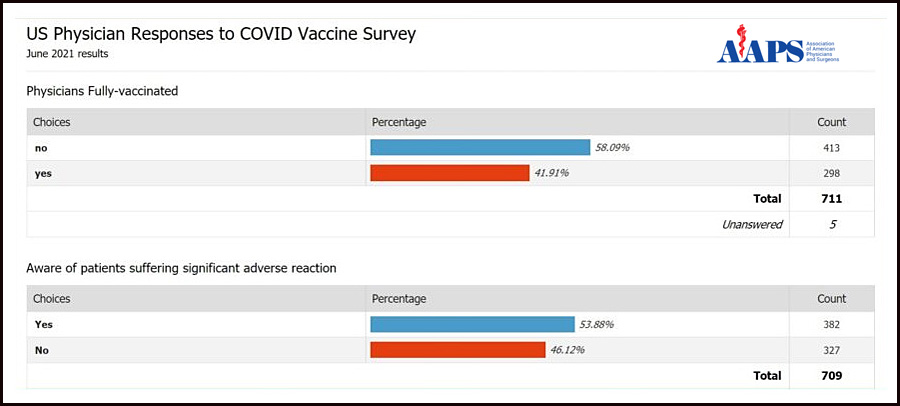
WASHINGTON, D.C. – The American Medical Association (AMA) and the Association of American Physicians and Surgeons (AAPS) have released surveys where they queried physicians as to their vaccination status against COVID-19, and the results these respective organizations both reported starkly contrasted one another.
The AMA’s web survey was conducted in June, and featured responses from 301 participants from fields ranging from Family Medicine, Internal Medicine, General Medicine, Pediatrics, OB/GYN, and other specialties. Of those surveyed, the AMA reports that 96 percent said that they had been fully vaccinated against COVID-19.
AMA President Susan R. Bailey, M.D., noted that the survey results indicate that physicians across the country have been leading vaccination efforts by example.
“Physicians and clinicians are uniquely positioned to listen to and validate patient concerns, and one of the most powerful anecdotes a physician can offer is that they themselves have been vaccinated,” she said. “You can take it from your doctor: the COVID-19 vaccines are safe and effective. With COVID-19 vaccines readily available and approved for all people 12 years old and up, we urge you to get vaccinated—take the single most important step you can to protect yourself, your family, and end the COVID-19 pandemic.”
In stark contrast, the AAPS web survey, also conducted in June with approximately 700 physician participants, indicates that only 40 percent of respondents indicated that they had been fully vaccinated. In addition, the survey also showed that 54 percent of physician respondents claimed they were aware of patients suffering a “significant adverse reaction.”

The purported side effects afflicting a percentage of COVID-19 vaccine recipients may be fueling a degree of hesitancy among those who have not yet been inoculated, according to AAPS executive director Jane Orient, M.D.
“It is wrong to call a person who declines a shot an ‘anti-vaxxer,’” she said. “Virtually no physicians are ‘anti-antibiotics’ or ‘anti-surgery,’ whereas all are opposed to treatments that they think are unnecessary, more likely to harm than to benefit an individual patient, or inadequately tested.”
There are currently no discernable reasons or factors that can explain the large discrepancies between the AMA and AAPS surveys.



Comments are closed.